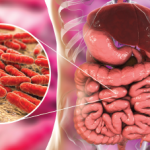Fecal microbial transplant: The latest approach to altering the human gut microbiome is fecal microbial transplant (FMT). Initially introduced as therapy for recurrent C. difficile infection, interest has emerged in the use of FMT as therapy for IBD, with mixed results to date.44,45 Evidently, anyone with a blender and a funnel can do this at home, although one might recommend limiting this to academic centers with proper screening procedures and procedural expertise (http://thepowerofpoop.com/epatients/fecal-transplant-instructions). The safety and utility of FMT for treating the vast majority of rheumatic conditions are currently unknown.
Concluding Remarks
Information about the contents and potential role of the microbiota in inflammatory diseases is rapidly advancing. Animal studies provide compelling evidence for an important role for the microbiota in the pathogenesis of inflammatory diseases. Although most human studies have been associative in nature, some studies have shown prognostic capacity of altered microbial diversity, and measures that alter the microbiota may have a therapeutic effect as well. Whether the next decade will see the emergence of microbiota-based therapies remains to be seen.
 Matthew Stoll, MD, PhD, MSCS, is an associate professor of pediatrics in the Division of Pediatric Rheumatology at the University of Alabama at Birmingham. His clinical and research interests are in pediatric spondyloarthritis and in the role of the microbiome in the pathogenesis of arthritis.
Matthew Stoll, MD, PhD, MSCS, is an associate professor of pediatrics in the Division of Pediatric Rheumatology at the University of Alabama at Birmingham. His clinical and research interests are in pediatric spondyloarthritis and in the role of the microbiome in the pathogenesis of arthritis.
References
- Qin J, Li R, Raes J, et al. A human gut microbial gene catalogue established by metagenomic sequencing. Nature. 2010 Mar 4;464:59–65.
- Stoll ML, Kumar R, Morrow CD, et al. Altered microbiota associated with abnormal humoral immune responses to commensal organisms in enthesitis-related arthritis. Arthritis Res Ther. 2014 Nov 30;16(6):486.
- Sokol H, Pigneur B, Watterlot L, et al. Faecalibacterium prausnitzii is an anti-inflammatory commensal bacterium identified by gut microbiota analysis of Crohn disease patients. Proc Natl Acad Sci U S A. 2008 Oct 28;105(43):16731–16736.
- Cao Y, Shen J, Ran ZH. Association between Faecalibacterium prausnitzii reduction and inflammatory bowel disease: A meta-analysis and systematic review of the literature. Gastroenterol Res Pract. 2014;2014:872725.
- Tejesvi MV, Arvonen M, Kangas SM, et al. Faecal microbiome in new-onset juvenile idiopathic arthritis. Eur J Clin Microbiol Infect Dis. 2016 Mar;35(3):363–370.
- Rook GA. Hygiene hypothesis and autoimmune diseases. Clin Rev Allergy Immunol. 2012 Feb;42(1):5–15.
- De Filippo C, Cavalieri D, Di Paola M, et al. Impact of diet in shaping gut microbiota revealed by a comparative study in children from Europe and rural Africa. Proc Natl Acad Sci U S A. 2010 Aug 17;107(33):14691–14696.
- Lukens JR, Gurung P, Vogel P, et al. Dietary modulation of the microbiome affects autoinflammatory disease. Nature. 2014 Dec 11;516(7530):246–249.
- Scher JU, Sczesnak A, Longman RS, et al. Expansion of intestinal Prevotella copri correlates with enhanced susceptibility to arthritis. Elife. 2013 Nov 5;2:e01202.
- Wu GD, Chen J, Hoffmann C, et al. Linking long-term dietary patterns with gut microbial enterotypes. Science. 2011 Oct 7;334(6052):105–108.
- Round JL, Lee SM, Li J, et al. The Toll-like receptor 2 pathway establishes colonization by a commensal of the human microbiota. Science. 2011 May 20;332:974–977.
- Rath HC, Herfarth HH, Ikeda JS, et al. Normal luminal bacteria, especially Bacteroides species, mediate chronic colitis, gastritis, and arthritis in HLA-B27/human beta2 microglobulin transgenic rats. J Clin Invest. 1996 Aug 15;98:945–953.
- Sinkorova Z, Capkova J, Niederlova J, et al. Commensal intestinal bacterial strains trigger ankylosing enthesopathy of the ankle in inbred B10.BR (H-2(k)) male mice. Hum Immunol. 2008 Dec;69(12):845–850.
- Zhang X, Zhang D, Jia H, et al. The oral and gut microbiomes are perturbed in rheumatoid arthritis and partly normalized after treatment. Nat Med. 2015 Aug;21(8):895–905.
- Stoll ML. Gut microbes, immunity, and spondyloarthritis. Clinical Immunol. 2015 Aug;159(2):134–142.
- Turnbaugh PJ, Hamady M, Yatsunenko T, et al. A core gut microbiome in obese and lean twins. Nature. 2009 Jan 22;457:480–484.
- Durban A, Abellan JJ, Jimenez-Hernandez N, et al. Structural alterations of faecal and mucosa-associated bacterial communities in irritable bowel syndrome. Environ Microbiol Rep. 2012 Apr;4(2):242–247.
- Scher JU, Ubeda C, Artacho A, et al. Decreased bacterial diversity characterizes the altered gut microbiota in patients with psoriatic arthritis, resembling dysbiosis in inflammatory bowel disease. Arthritis Rheumatol. 2015 Jan;67(1):128–139.
- Michail S, Durbin M, Turner D, et al. Alterations in the gut microbiome of children with severe ulcerative colitis. Inflamm Bowel Dis. 2012 Oct;18(10):1799–1808.
- Alekseyenko AV, Perez-Perez GI, De Souza A, et al. Community differentiation of the cutaneous microbiota in psoriasis. Microbiome. 2013 Dec 23;1(1):31.
- Ganju P, Nagpal S, Mohammed MH, et al. Microbial community profiling shows dysbiosis in the lesional skin of Vitiligo subjects. Sci Rep. 2016 Jan 13;6:18761.
- Nylund L, Nermes M, Isolauri E, et al. Severity of atopic disease inversely correlates with intestinal microbiota diversity and butyrate-producing bacteria. Allergy. 2015 Feb;70(2):241–244.
- Giongo A, Gano KA, Crabb DB, et al. Toward defining the autoimmune microbiome for type 1 diabetes. ISME J. 2011 Jan;5(1):82–91.
- Taur Y, Jenq RR, Perales MA, et al. The effects of intestinal tract bacterial diversity on mortality following allogeneic hematopoietic stem cell transplantation. Blood. 2014 Aug 14;124(7):1174–1182.
- Stoll ML, Wilson L, Barnes S, et al. Multi-omics study of gut microbiota in enthesitis-related arthritis identify diminished microbial diversity and altered typtophan metabolism as potential factors in disease pathogenesis [abstract 2820]. Arthritis Rheum. 2015 Sep 29;67(suppl 10).
- Jenks K, Stebbings S, Burton J, et ak. Probiotic therapy for the treatment of spondyloarthritis: A randomized controlled trial. J Rheumatol. 2010 Oct;37(10):2118–2125.
- Brophy S, Burrows CL, Brooks C, et al. Internet-based randomised controlled trials for the evaluation of complementary and alternative medicines: Probiotics in spondyloarthropathy. BMC Musculoskelet Disord. 2008 Jan 11;9:4.
- Shukla A, Gaur P, Aggarwal A. Double blind placebo controlled randomized trial of probiotics in enthesitis-related-arthritis category of JIA: Effect on clinical and immunological parameters [abstract 957]. Arthritis Rheum. 2015 Sep 29;67(suppl 10).
- Hatakka K, Martio J, Korpela M, et al. Effects of probiotic therapy on the activity and activation of mild rheumatoid arthritis—A pilot study. Scand J Rheumatol. 2003;32(4):211–215.
- Mandel DR, Eichas K, Holmes J. Bacillus coagulans: A viable adjunct therapy for relieving symptoms of rheumatoid arthritis according to a randomized, controlled trial. BMC Complement Altern Med. 2010 Jan 12;10:1.
- Pineda Mde L, Thompson SF, Summers K, et al. A randomized, double-blinded, placebo-controlled pilot study of probiotics in active rheumatoid arthritis. Med Sci Monit. 2011 Jun;17(6):CR347–CR354.
- Alipour B, Homayouni-Rad A, Vaghef-Mehrabany E, et al. Effects of Lactobacillus casei supplementation on disease activity and inflammatory cytokines in rheumatoid arthritis patients: A randomized double-blind clinical trial. Int J Rheum Dis. 2014 Jun;17(5):519–527.
- Chibbar R, Dieleman LA. Probiotics in the management of ulcerative colitis. J Clin Gastroenterol. 2015 Nov–Dec;49(Suppl 1):S50–S55.
- Uusitalo U, Liu X, Yang J, et al. Association of early exposure of probiotics and islet autoimmunity in the TEDDY study. JAMA Pediatr. 2016 Jan 1;170(1):20–28.
- Kronman MP, Zaoutis TE, Haynes K, et al. Antibiotic exposure and IBD development among children: A population-based cohort study. Pediatrics. 2012 Oct;130(4):e794–e803.
- Virta L, Auvinen A, Helenius H, et al. Association of repeated exposure to antibiotics with the development of pediatric Crohn’s disease—A nationwide, register-based Finnish case-control study. Am J Epidemiol. 2012 Apr 15;175(8):775–784.
- Arvonen M, Virta LJ, Pokka T, et al. Repeated exposure to antibiotics in infancy: A predisposing factor for juvenile idiopathic arthritis or a sign of this group’s greater susceptibility to infections? J Rheumatol. 2015 Mar;42(3):521–526.
- Horton DB, Scott FI, Haynes K, et al. Antibiotic exposure and juvenile idiopathic arthritis: A case-control study. Pediatrics. 2015 Aug;136(2):e333–e343.
- Barber CE, Kim J, Inman RD, et al. Antibiotics for treatment of reactive arthritis: A systematic review and metaanalysis. J Rheumatol. 2013 Jun;40(6):916–928.
- Saviola G, Abdi-Ali L, Campostrini L, et al. Clarithromycin in rheumatoid arthritis: The addition to methotrexate and low-dose methylprednisolone induces a significant additive value—A 24-month single-blind pilot study. Rheumatol Int. 2013;33(11):2833–2838.
- Heuschkel RB, Menache CC, Megerian JT, Baird AE. Enteral nutrition and corticosteroids in the treatment of acute Crohn’s disease in children. J Pediatr Gastroenterol Nutr. 2000 Jul;31(1):8–15.
- Hagen KB, Byfuglien MG, Falzon L, et al. Dietary interventions for rheumatoid arthritis. Cochrane Database Syst Rev. 2009 Jan 21;(1):CD006400.
- Berntson L. Anti-inflammatory effect by exclusive enteral nutrition (EEN) in a patient with juvenile idiopathic arthritis (JIA): Brief report. Clin Rheumatol. 2014 Aug;33(8): 1173–1175.
- Suskind DL, Brittnacher MJ, Wahbeh G, et al. Fecal microbial transplant effect on clinical outcomes and fecal microbiome in active Crohn’s disease. Inflamm Bowel Dis. 2015 Mar;21(3):556–563.
- Suskind DL, Singh N, Nielson H, Wahbeh G. Fecal microbial transplant via nasogastric tube for active pediatric ulcerative colitis. J Pediatr Gastroenterol Nutr. 2015 Jan;60(1):27–29.

